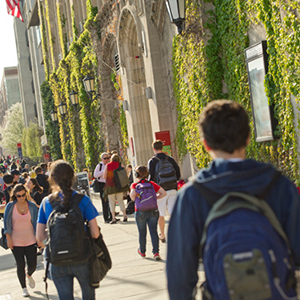University acceptance letters are a bit like party invitations: you never know who will say yes. Judging by this year’s robust enrollment, a great many students had been waiting for Boston University’s invitation to the Comm Ave ball.
“BU is hot; people want to be here,” says Kelly Walter, an associate vice president and executive director of admissions, who credits the size of the class to the University’s strengthening reputation in the marketplace. “They said yes in a big way, and we’re thrilled.”
The Class of 2018 is big. It has 3,900 students, roughly 200 above what admissions staff had anticipated. It’s also diverse. More than half of the new Terriers are international or minority students. And it’s brainy, with 59 percent of students coming from the top 10 percent of their high school class. And talented. One student played violin with the Philippine Philharmonic Orchestra, another trained guide dogs for people who are visually impaired, and another interned at Beth Israel Deaconess Hospital, doing research on the connection between cystic fibrosis and chronic pancreatitis.
The freshmen survived a competitive admissions process; only 34 percent of the record-breaking 54,191 students who applied to BU were offered entry. Like waves of students before them, they arrive with stellar academic records. Their average GPA is a solid A- and their average SAT score is 1946, 15 points higher than last year’s class.
This “very significant jump” in SAT scores, Walter says, put a smile on the face of President Robert A. Brown. “We are clearly attracting higher-caliber students.”
Walter says 23 percent of the incoming class is international and another 32 percent comes from a minority population, with 16.2 percent Asian American, 9.8 percent Hispanic, and 5.3 percent African American.

The freshman class of 3,900 is larger than anticipated, with students representing 72 countries and 48 states, Puerto Rico, the US Virgin Islands, and the District of Columbia. Photo by Jackie Ricciardi
The University enrolled students from 72 countries—6 more than the previous year. Most international students come from China, followed by India, South Korea, Canada, and Taiwan. (India and South Korea swapped places this year.) New Terriers come from all four corners of the globe, hailing from Bulgaria, Botswana, Cyprus, Turkmenistan, El Salvador, Hungary, Paraguay, and Zimbabwe—to name a smattering of countries not represented in last year’s class.
Walter says diversification is a priority in admissions.
“You have to make sure you’re bringing together students, faculty, and administrators from around the world who are from different cultures, different nationalities, and who have different points of view and frames of reference,” she says. “It’s that sharing of ideas, advancing of knowledge from different people, different mind-sets. That’s what education is all about.”
On the home front, freshmen come from Puerto Rico, the US Virgin Islands, the District of Columbia, and 48 states—2 more than last year. The only holdouts are the Dakotas. (“We gotta work on that,” Walter says.) The top five states of origin are Massachusetts, New York, California, New Jersey, and Pennsylvania. (Pennsylvania bumped Connecticut this go-round.)
The new class is 62 percent female, 38 percent male. That’s not far from the University-wide 60 to 40 split.
Julie Wickstrom, director of BU Financial Assistance, says 52.7 percent of the class is receiving financial aid, from grants to subsidized loans to work-study jobs, 47.1 percent is receiving University-financed aid, and 13.6 percent is getting need-based federal Pell grants.

















































This article is great, except for the gender inequality it contains. If the author and university truly care about gender equality, they would replace the word “Freshman” with “First Year” student, as follows:
1) “First year class grand, gifted and global”
2)”The first year students survived a competitive admissions process”
3) “On the home front, first year students come from Puerto Rico, etc”
With these 3 simple, non-awkward changes, this article becomes beautiful because it speaks in gender equal terms.
Of course, if “First Year student” doesn’t sit well with anyone, or gender equality is not your thing, a case could be made that “Freshwomen” is more accurate to describe the students of the Class of 2018, given the fact that 62% are female and only 38% are male.
Do you think male students would mind being called “Freshwomen”, the way women have had to tolerate being called “Freshmen” all these years? Clearly gender equality thru gender neutrality is best.
I couldn’t wait to forward this to other Class of ’81 BU alumni on the West Coast and in NY. I applaud the effort to include stats on BU’s inclusion of individuals of “different cultures, different nationalities and who have differing points of view and frames of reference.” How well is the University doing honoring its founders’ ideals and commitment toward Afreican-American learners?